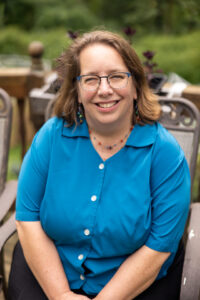
By Marianne Lyons Delorey, Ph.D.
A long time ago, I worked closely with an older resident named Lucille whose dementia was severe and fairly all encompassing. She couldn’t do much for herself anymore. She even struggled to eat, forgetting to swallow what she was chewing. At one point, I was doing a postcard campaign with some more able residents and put a pen and postcard in front of her so she would feel like she was part of the group. She copied down exactly what I read aloud and to my surprise, she seemed to enjoy the task. I went over to her to see how she was doing and was delighted to see that her spelling was great and her penmanship was beautiful. Her penmanship, combined with her ability to follow directions and her genuine joy at being involved, led me to an idea.
Lucille had a brother, Bill, who lived far away. Her brother wrote to her very regularly, and Lucille would hold onto these letters and read them repeatedly. In my years working with Lucille, I’m not sure I ever saw her write back, but perhaps it was because she did not have the opportunity.
I got out some paper and a pen and suggested she write to Bill. She needed a great deal of help coming up with what to say, but again, she was engaged and present in her world. I found a stamp and copied the return address from one of the many letters she had received. Her brother was elated! He knew on some level that the words he read were not Lucille’s, but he was still over the moon to see her writing and to read the letter in her voice.
I think of Lucille when I think about the Restaurant of Mistaken Orders – a dementia friendly pop-up restaurant in Japan. At this restaurant, all the waitstaff have some level of dementia. The customers understand that they may not get what they ordered, and the customers accept that. The waitstaff may sit down with them instead of getting them drinks. And they may be served their tea with a straw.
The restaurant exists to tap into the abilities the staff with dementia can still do and to give them meaningful interactions with people. The point is also to create an opportunity to expose customers to older adults with dementia. The restaurant is filled with happiness, kindness, and laughter, sometimes at mistakes, but also at the shared humanity.
There are some who believe this model offers people the opportunity to laugh at people instead of laughing with them. This is a valid concern. But Japan is considered a super-aging society and in 2025 one in five people will have some level of dementia. It seems important to tap into the abilities people still have rather than focus on what they can no longer do. It seems like we could do a better job of exploring the forgotten skills that may still exist, like handwriting for Lucille, so that we can encourage people to be involved and connected to their communities.
As Bill knew, we are not going to see the whole human as they once were. That is okay. But we are going to continue to see the humanity in people who may have forgotten their own worth. And, since all of us make mistakes regardless of our abilities, we can learn to laugh at what makes us human, and interesting.
Marianne Delorey, Ph.D., is the executive director of Colony Retirement Homes.
She can be reached at 508-755-0444 or mdelorey@colonyretirement.com
and www.colonyretirementhomes.com.
RELATED CONTENT:












